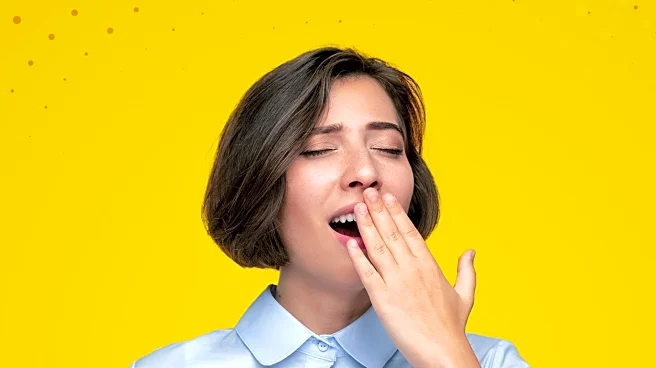What's Happening?
A growing trend on social media involves individuals taping their mouths shut at night in an attempt to improve sleep quality and reduce snoring. This practice, however, is not supported by scientific evidence and has raised concerns among medical professionals. Dr. Kimberly Hutchison, a neurologist and sleep medicine expert at Oregon Health & Science University, highlights the modest benefits and potential risks associated with mouth taping, including exacerbating sleep disorders like sleep apnea or causing suffocation. Mouth breathing during sleep can lead to dry mouth, irritated throat, bad breath, and oral health issues, but experts advise against using mouth tape as a solution. Instead, they recommend exploring other options such as prescription mouthpieces or CPAP machines, especially for individuals with underlying conditions like obstructive sleep apnea.
Why It's Important?
The significance of this development lies in the potential health risks associated with mouth taping, a practice gaining popularity despite lacking scientific validation. The trend underscores the influence of social media on health behaviors and the need for public awareness regarding safe and effective sleep improvement methods. Medical professionals emphasize the importance of understanding the root causes of mouth breathing, which could indicate serious health issues like sleep apnea. Addressing these underlying conditions through appropriate medical interventions can improve sleep quality and overall health, reducing the risk of long-term consequences associated with poor sleep. The discourse around mouth taping also highlights the broader issue of misinformation in health practices promoted online.
What's Next?
Medical experts suggest that individuals experiencing mouth breathing during sleep should seek professional evaluation to determine the underlying causes. Sleep tests, which can be conducted at home, are recommended to diagnose conditions like sleep apnea accurately. Once diagnosed, individuals can make informed decisions about pursuing appropriate therapies, such as CPAP machines or lifestyle changes like weight loss and smoking cessation. The ongoing conversation about mouth taping may prompt further research into safe and effective sleep improvement strategies, potentially influencing public health guidelines and consumer behavior.
Beyond the Headlines
The mouth taping trend reflects broader societal issues related to health misinformation and the impact of social media on personal health decisions. It raises ethical questions about the responsibility of platforms and influencers in promoting unverified health practices. Additionally, the trend highlights the cultural emphasis on quick fixes for health issues, often overshadowing the importance of comprehensive medical evaluation and evidence-based treatments. As awareness grows, there may be increased advocacy for responsible health communication and education to prevent the spread of potentially harmful practices.










